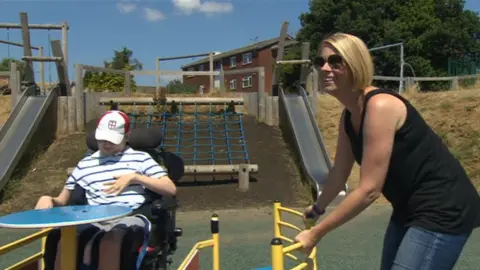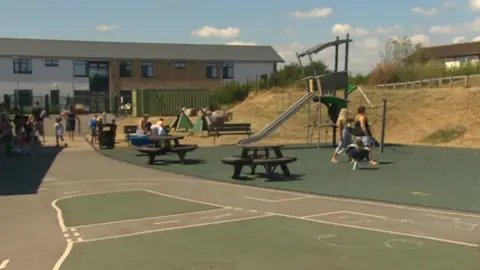Call for more disabled-friendly playgrounds around Wales
 BBC
BBCA mother has described the pain of watching children running around a park while her disabled son cannot join in.
Lynsey Summer's 14-year-old son Jacob has quadriplegic cerebral palsy and he is frustrated at the lack of parks with facilities for disabled children.
His specialist school in the Vale of Glamorgan will open its playground on Saturdays but a charity wants more inclusive play areas elsewhere.
Disability Wales said children are missing out on their right to play.
"People desperately want their children to be included, you want to go out into the sunshine, you want to take them in the fresh air, you want them to go on a roundabout or a swing, you don't want to sit and watch everyone else's children do what yours can't," Ms Summer said.
"Jacob's at an age now where he understands he can't do things that his siblings can do, that other children can do and it's starting to upset and frustrate him, if he had that opportunity we wouldn't have that pain for him, things like this can be remedied."
Jacob attends a specialist school which has a playground with equipment including a wheelchair accessible roundabout, swings and slides.

In June, the school began a pilot project, opening the playground on Saturday afternoons.
Marie Clare Watt, the school's family engagement officer said the response was overwhelming and Saturday play will be a permanent part of school life from September.
"Some of our pupils have got noise sensitivity, different behaviours, the parks aren't always safe and secure, not wheelchair accessible," she said. "This is a really inclusive environment."
Clare Johnson's seven-year-old son George has an autistic spectrum condition and is non verbal. He is sensitive to noise and heat.
She said being in a play environment where her son is accepted and understood is vital as sometime children are stared at when they get upset.
"People don't realise they're doing it, it's not just the adults, the children too - they see something different, it's not the norm for them, but it can be hurtful," she said.
Ruth Nortey, policy and research officer for Disability Wales, said disabled children should have equal access to play areas.
"It's really disappointing to hear there aren't places for parents to take their children or their children are becoming really upset because they're going somewhere and then finding that it's not accessible to them," she said, adding that private play providers need to think more about the needs of disabled children too.
Earlier this month a 10-year-old boy from Neath riased £85,000 for an inclusive play park in memory of his young friend who died of cancer.
Wales was the first country in the world to legislate for play in 2010.
It means local authorities must undertake a play sufficiency assessment every three years and secure sufficient play opportunities.
A Welsh Local Government Association spokesman said: "All authorities take very seriously their statutory duties to assess and secure sufficient play opportunities for children in their areas.
"This includes ensuring they offer inclusive play opportunities to encourage all children to play together if they wish, and that the play requirements and support needs of disabled children are understood and provided for."
